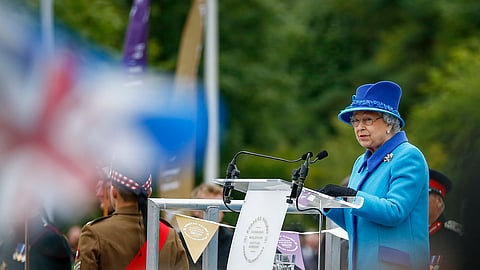

Queen Elizabeth II was laid to rest at the King George VI Memorial Chapel at Windsor Castle on sept. 19, ending an era. During her office, she conferred multiple honorary titles on deserving individuals from all spheres of life in public acknowledgment of their courage, excellence, or service.
One such honor is Knighthood, bestowed for significant and inspirational contributions. Over the years, various British and foreign nationals received this award. In memory of Queen Elizabeth II, I did some digging. Here are some of the people of Indian origin she knighted during her era.
Ravinder Nath Maini, the retired director of the Kennedy Research Institute and Emeritus Professor at Imperial College London, was awarded the Knighthood in 2003 for his studies in Rheumatology. He led a 15-year-long research that developed anti-TNF drugs.
Storied nonfiction writer Salman Rushdie was knighted for his services to literature in 2007. In addition, he was awarded the Companion of Honour title in 2022.
2009 Nobel Prize Laureate in Chemistry, structural biologist Venkatraman Ramakrishnan was knighted in 2012 for his “services to molecular biology.”
“In the current debate about immigration, it is worth noting that this award is yet another example of the numerous contributions that immigrants make to British society,” he told Press Trust of India when he received the Knighthood from Queen Elizabeth II.
UK’s first Sikh and Asian judge, Mota Singh, was awarded Knighthood in 2010 for services to the Administration of Justice, Community Relations, and the Voluntary Sector.
IIT Kharagpur alumnus Arun Sarin received the Knighthood in 2010 for his work in the communication sector.
He migrated to the US and obtained an MBA from the Haas School of Business at the University of California, Berkeley, in 1978.
From 2003 to 2008, he served as the CEO of telecom giant Vodafone. He is a board member of Bangalore-based Ola Cabs.
Tejinder Virdee, a physics professor at Imperial College, London, and world-renowned experimental particle physicist received the Knighthood in 2014 for his “services to science.”
He is one of the creators of the Compact Muon Solenoid Experiment at the Large Hadron Collider, CERN, Geneva, which resulted in the groundbreaking discovery of the Higgs boson.
Indian industrialist and Chairman Emeritus, Tata Sons and Tata Group, Ratan Tata, received the honorary Knighthood from Britain in 2014.
Sir James Bevan, then British High Commissioner to India, handed over the award on behalf of Queen Elizabeth II.
Queen Knighted Harshad Kumar Dharamshi Bhadeshia, a Tata Steel Professor of Metallurgy at the University of Cambridge, in 2015 for his services to science and technology.
Bhadeshia was born and brought up in Nairobi, Kenya. However, his parents are of Indian origin. Later he and his family migrated to the UK in 1970. He obtained his Ph.D. from the University of Cambridge for his work on the theory of retained austenite in steels.
Cancer Research UK chief executive, Harpal Singh Kumar, received the prestigious title in 2016 for his services to cancer research.
As a Union for International Cancer Control board member, Singh acknowledged his entire team. “It’s really a reflection of the very, very big team of people who make what we do possible, from the scientist to the doctors, to the volunteers to the staff and people around the world working to reduce the fear of cancer for people,” Belfast Telegraph reported him as saying about receiving the Knighthood.
Singh holds an MBA from Harvard Business School.
Shankar Balasubramanian, Herchel Smith Professor of Medicinal Chemistry at Cambridge University, was honored with Knighthood in 2017 “for services to science and medicine.”
“My extended family is still largely based in South India, and both I and my immediate UK-based family will continue to maintain those connections by regular visits,” he said when speaking to Telegraph about the relevance of his Indian connections.